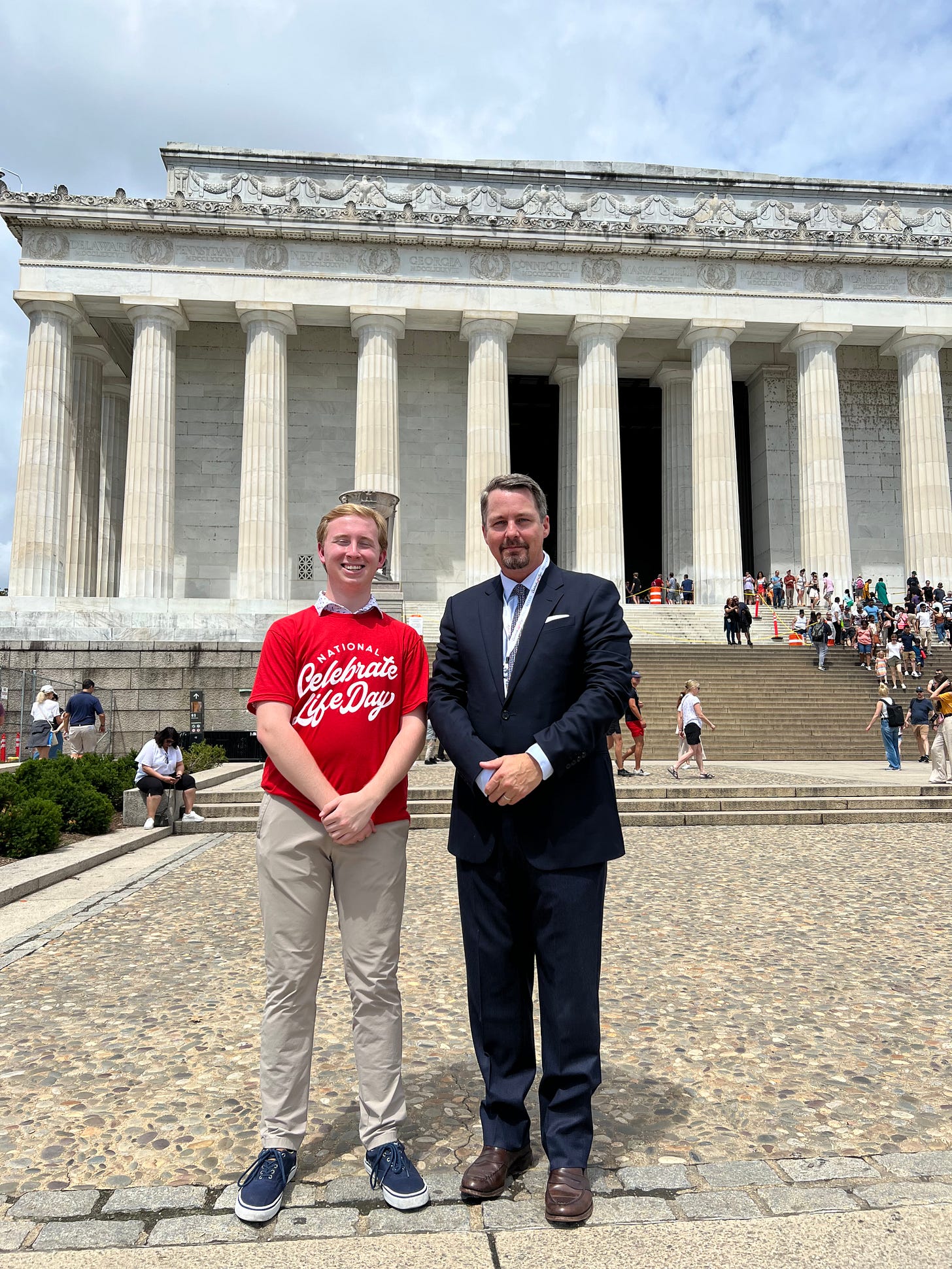Post-Roe Revolution
The post-Roe revolution is just getting started.
William Benson co-founded The American Postliberal and served as editor-in-chief from 2023–2025.
This past Saturday, the first National Celebrate Life Day rally was hosted on the steps of the Lincoln Memorial. It should go without saying that this event was indeed a fitting and inspiring recognition and celebration of the one-year anniversary of the overturn of Roe v. Wade, the infamous decision that legalized abortion nationwide for fifty years in the United States. Like many pro-life events and rallies, it was particularly inspiring to see the amount of youth involved with it, whether it be attending, organizing, or volunteering for the event. It is clear that this new generation is well equipped to tackle the challenge of ending abortion, which still persists in much of the country.
While all of these are causes for hope, there are two prominent questions about the pro-life movement that remain as it moves into a post-Roe era. These should not be considered criticisms of the pro-life movement, for it achieved what was thought to be impossible, but as guiding questions for where we go from here. Two of the best speakers at the rally, Dr. Chad C. Pecknold of The Catholic University of America and Michael Knowles of the Daily Wire, exemplified these questions.
What is our national strategy on abortion? Among the fanfare and the traditional rhetoric on abortion, what was lacking from the rally was not the energy, motivation, or passion, but the message and organization. Today, the pro-life movement struggles to determine whether its strategy to end abortion is taking place at the state or national level. This is not to say that it cannot happen on both levels, but where the emphasis will be placed must be decided. While most prominent political figures who attended the rally emphasized that the issue must be decided at the state level, ultimately, something much more radical is needed: a national abortion abolition strategy.
As Dr. Pecknold stated in his remarks:
We must end abortion, not through the false freedom of democratic choice, but through the true liberty of living in accord with what is right and just. We must end abortion through the Executive power to interpret the equal protection clause of 14th amendment as including human persons in the womb. We must end abortion through Congress, through innovative legislation that makes abortion unthinkable. But we cannot end abortion by “returning it to the states,” by relying on the democratic choosing power.
Pecknold exemplifies the clear and consistent messaging that is needed. The pro-life movement must recognize that it is not primarily a democratic movement. Slavery was not ended in the United States by democratic choice. So too, abortion is not an issue that can be subjected to democratic debate. Most pro-life individuals intuitively recognize this, but the movement is a long way from realizing it. While work must be done at the state level, the federal level is where the most opportunities lie. “Innovative legislation,” such as “making birth free,” is a necessary first step of building a culture of life at the federal level. Ultimately, however, all of this must culminate with clear and consistent messaging from our national politicians while being willing to use state power to eradicate abortion nationwide. Fourteenth Amendment personhood recognition is the target. To believe that the free market or states rights can end abortion is a naive belief in the democratic faith. Murder is murder, no matter the state.
What is freedom? Michael Knowles spoke on a topic that he remarks on often: freedom versus license. Knowles spoke of freedom not as “doing what we want to do,” but “doing what we ought to do.” This “redefinition” of our modern freedom is critical to ending abortion nationwide. Originally conceived, the pro-life movement was smart to adopt the language of the American “rights” tradition. However, as the liberal imperium breaks before our eyes, more substantive language to highlight our communal obligations in regards to life is essential. Ensuring that every person can live is one thing, but ensuring that every person can flourish is another. Knowles pointed out that politics is not just “procedural norms,” and he is right. Like Pecknold, both of these men recognize that abortion will not end as a result of democratic procedure, rights-language, and simply “changing hearts and minds,” but by using the state power available to us to fulfill our political obligations. This is the message and the courage that the pro-life movement would benefit from the most.
Therefore, the postliberal way forward lies not with a belief in states rights, procedural norms, or mere talking points, but a firm reliance on the truth that killing a baby anywhere is a moral abomination and we in the political community have a duty to put an end to it. Postliberals must take it upon themselves not only to share this message but enact it at the highest levels of government. A national abortion abolition strategy will be difficult, there is no doubt of that, but it may be the first opportunity to unite the political right around a plan and message that many have been apprehensive about: state power and the common good. Already, we are seeing arguments for a national abortion abolition strategy play out, and if the National Celebrate Life Day rally was any indication, the post-Roe revolution is just getting started.



Great thinking and writing. I like the focus on the 14th Amendment.
Abortion is at the heart of liberal anthropology. Overturn this peculiar institution and the whole edifice comes crashing down and a culture of life is born.